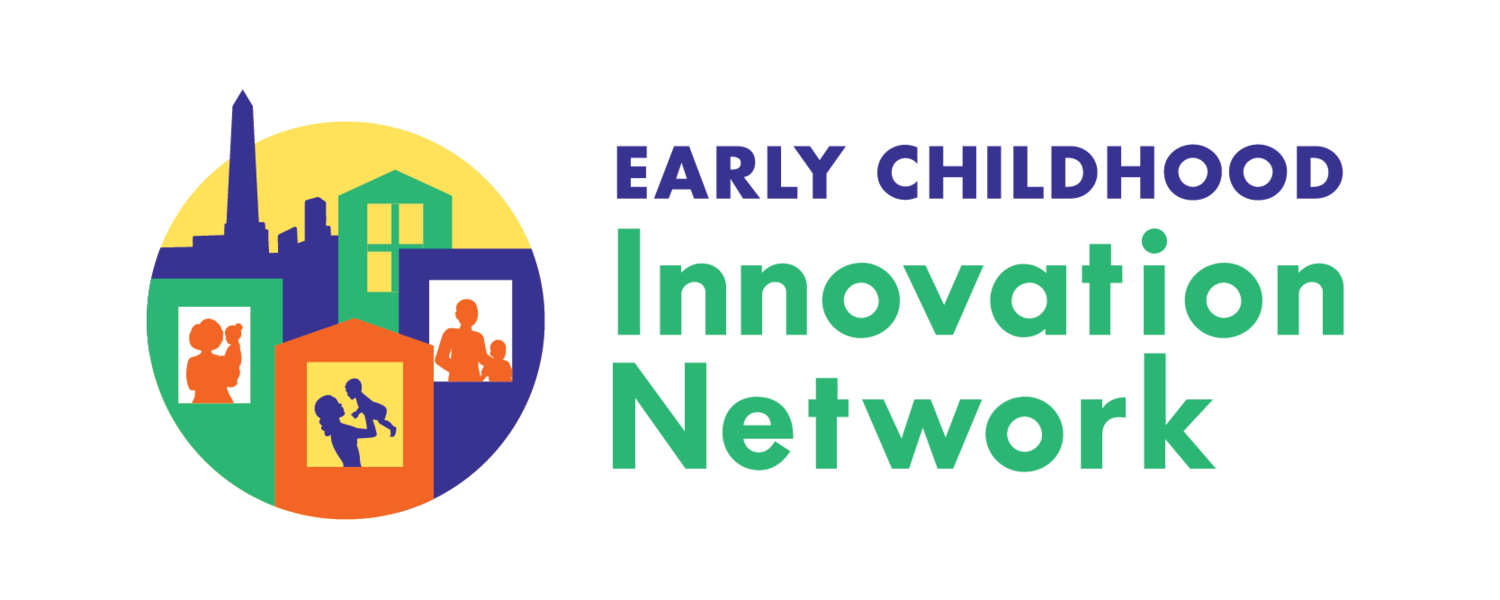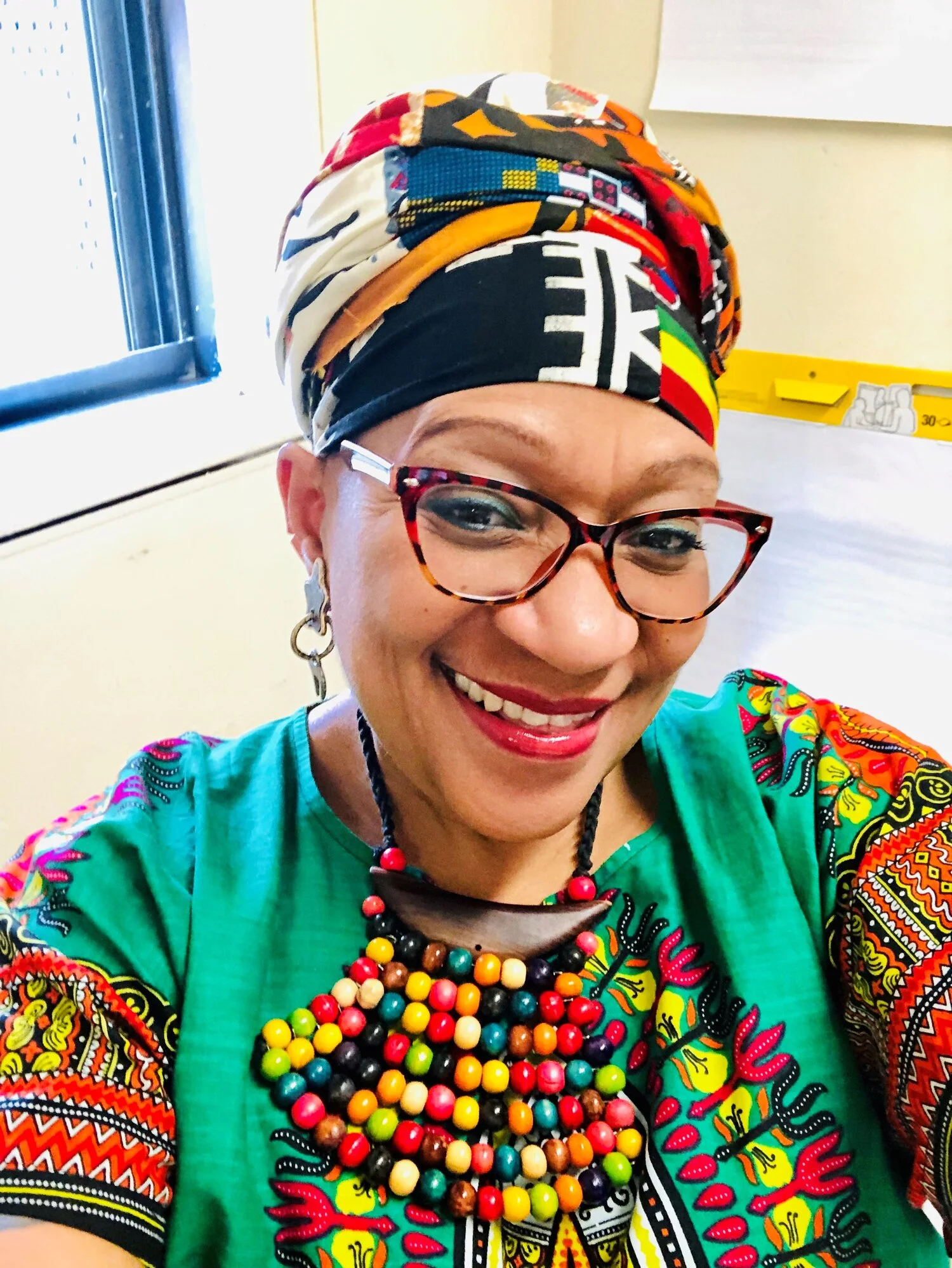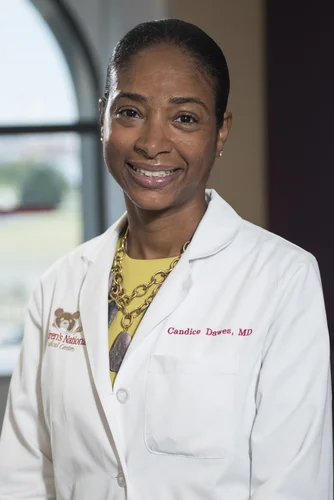Read more about how ECIN’s innovative programs and partnerships are keeping parents well, building healthy brains, and preparing all children to learn.
Teamwork and Support: HealthySteps DC and Children's Health Center at THEARC
In a busy pediatric primary care clinic like Children’s National at THEARC, teamwork and collaboration are key to caring for every family who comes through the doors. When HealthySteps DC embedded a developmental and clinical psychologist, Dr. Sharon Singh, at the location, it took very little time for her to become an integral part of the health clinic’s team. She formed a special bond with the location’s staff, especially pediatrician Dr. Chidiogo “Diogo” Anyigbo. Together they’ve developed a great system for working together with families and supporting each other.
DIOGO ANYIGBO, A PEDIATRICIAN, AND SHARON SINGH, A DEVELOPMENTAL PSYCHOLOGIST, HAVE FORMED A SPECIAL BOND THAT ENHANCES HOW THEY WORK TOGETHER AT CHILDREN’S NATIONAL AT THEARC.
“Having someone like Dr. Singh available to pull in during the regular flow of a visit makes a world of difference for the patients,” says Dr. Anyigbo. “She uses her expertise to coach parents in how to support their children in meeting developmental milestones and addressing behavior challenges in early childhood. She takes extra time to meet some of the needs we, as physicians, can’t always get to in the course of a routine well-child check. She forms a foundation for families to thrive and is a great resource for nurturing positive parent-child relationships.”
Clear and frequent communication is key to their successful collaboration. Both make it a point to read the other’s notes in the patient’s record before meeting with a family. “It is hard to build rapport and trust if a parent feels like they are repeating themselves or their story over and over to different people,” says Dr. Singh.
In several cases, they’ve taken turns making crucial follow ups with social service organizations and families in crisis to make sure urgent needs are met in a timely manner. When Dr. Singh learns a parent is exceptionally stressed during a social services meeting, for example, she relays the information to Dr. Anyigbo for follow up during the next well visit. Frequently, Dr. Aniygbo will then bring Dr. Singh in to ensure the family knows they have support from many people in the clinic.
“It’s especially awesome to be in the clinic because I can go to all the well-child visits during the newborn period. I have the opportunity to meet and connect with families from the beginning of their child’s life, to build trust and rapport with them. We combine our different experiences and expertise to support families. They know they have a team that’s there for them as they go on this journey with their babies,” says Dr. Singh
And in the midst of finding ways to work together in supporting families, they’ve also formed a bond that helps them support each other.
“We learn from each other,” adds Dr. Anyigbo. “Clinic can be stressful, but to know that you have a team backing you up, especially on a hard day or during a frustrating time, it can make a big difference in how you cope. There’s really nothing better than having the support of the people you work with most.”
Early Childhood Mental Consultation in Appletree Early Learning Centers
Early childhood education programs give children ages 3, 4, and 5 a platform of skills for school and life. But oftentimes, other things in a child’s life can keep him or her from learning in preschool. That’s why Appletree Early Learning partnered with the Early Childhood Innovation Network to bring mental health consultants from Georgetown’s WISE Center into their Washington, D.C., early education centers. The early childhood mental health experts provide on-site support and evaluation services like coaching for teachers and school leaders, to help schools meet the educational, social and emotional needs of young children.
“Some of our kids have experienced things that not even adults could handle, and they’ve been on this planet for such a short amount of time. This partnership brings skills and strategies into our schools that help us get our kids on the right path and moving forward as early as possible.”
Douglas Knoll: Trauma-sensitive adults help kids thrive
“Many families come to us with some form of trauma like homelessness, hunger, or family member incarceration,” says Charlie Crabtree, principal of Appletree Early Learning’s Douglas Knoll school, located in southeast Washington, D.C.
As year one of the Early Childhood Mental Health Consultant program got underway at the Douglas Knoll school, it became clear that the teachers and kids would benefit from more than the initial scope of work involving observation and feedback. Principal Charlie Crabtree’s long-term goal is for Douglas Knoll to become a Trauma-Sensitive School, where every adult, no matter their role, knows how to interact and communicate with young children as well as parents and fellow teachers who may have experienced traumatic events. To get there, he is working with the WISE Center’s Dr. Brenda Terry-Leonard to offer professional development courses for school staff about how to use trauma-informed strategies. The Early Childhood Mental Health Consultant program also organized school-based parenting skills and coping workshops for families.
“We’ve been so pleased that the mental health consultant program has been adaptable to the needs of our teachers and our students. Kids can be really resilient, and we’re working together to make sure our school gives them the chance to grow every day.”
Lincoln Park: Building a strong home to school connection
Many Appletree Early Learning Lincoln Park preschoolers face challenges outside of school and many have been exposed to traumatic events. The school’s principal, Megan Marrinan, says that every child at the school is entitled to an excellent and equitable education. That means working with Early Mental Health Childhood consultant Dr. Terry-Leonard to make sure any social or emotional challenges that may prevent a child from learning at school can be addressed.
“Dr. Terry-Leonard gives us invaluable flexibility, knowledge and capability. What’s best for students and staff in the fall may not be what’s best for us in the spring, especially when almost one half of our student population leaves us for grade school each year,” says Principal Marrinan. “She has been an integral part of our work to bridge and build home to school connections. Through coaching, professional development, parent-focused workshops and one-on-one meetings, she’s helped us make the school a collaborative space for families and teachers to work together to promote the social and emotional advancement of our students.
Family Stories
Every family has a rich and unique story to tell. The experiences we share here illustrate resilience in families we've worked with across Washington, D.C.
Peer Support and Sharing at Parent Cafés
ECIN’s Parent Cafés are physically and emotionally safe spaces where parents and caregivers talk about the challenges and victories of raising a family. Through individual deep self-reflection and learning, participants explore their strengths, learn about the Protective Factors, and create strategies from their own wisdom and experiences to help strengthen their families.
“I did not realize it [the program] would teach me both to speak and to listen. The session’s focus on the deeply rooted and significant protective factors that we need in order to advocate for and take care of our families really resonated with me.”
Kora Wooten
Kora Wooten, a mother of four boys ages 8 to 13, expected the Parent Café she signed up for to be similar to other parent-focused classes she had attended in the past, but was still looking forward to attending. “I’m always interested in finding new ideas. Having four boys can be really challenging,” she says.
The Parent Café was different, however. “Everyone got to share their experiences. Hearing other people’s stories, seeing their emotions come out, and having the whole group support what you have to say—that’s a big plus for me,” she adds.
Today, Kora recommends the Parent Cafes to everyone she speaks to. “Everyone needs more tools, but people don’t like being told what to do. The Café session was different.”
Gladys Mathis
gladys mathis honed her voice and her listening skills at the parent cafÉ she attended.
Gladys Mathis has been a tireless advocate for the health and well-being of two family generations in her house: her own children and now her grandchildren. Until recently, though, she says she felt like she was never listened to.
“At the Parent Café, I learned how to hone my own voice but also learned the importance of listening to others,” she says. “Before that, I felt like my voice was never heard. Everything I’d endured for 15 to 20 years was arbitrary: Me being told what was recommended for my child or what I needed to do with medication.”
“I came to the program thinking it would focus on different aspects of family leadership. I did not realize it would teach me both to speak and to listen. The session’s focus on the deeply rooted and significant protective factors that we need in order to advocate for and take care of our families really resonated with me. I came away with new tools, like the importance of allowing my community into my world to help me. Before, I was proud to say I was a single mother who did it all myself. I never thought for a second that it would be feasible for me to maintain pride and sense of decency in my household and still allow someone to step in and support me.”
After the Parent Café, for the first time, Ms. Mathis arranged for respite care providers for her special needs child, something she had never done before. “The Parent Café had a tremendous domino effect in the ways I care for myself, and also my family,” she says.
HealthySteps and the Johnson Family*
Ms. Johnson is raising three children in Washington, DC. She works hard to take each of her children to regular visits at the pediatrician’s office, but doctors realized the family was missing important check-ups for her infant and toddler.
The doctor referred Ms. Johnson to the HealthySteps team at Children’s Health Center-Anacostia. The HealthySteps team learned that Ms. Johnson had experienced domestic violence and suffered from depression. The HealthySteps Specialist offered therapy sessions and connected her to a peer support group. Additionally, the HealthySteps Family Champion learned that the family had not been able to connect to early intervention services to address speech delay in the toddler. The Family Champion worked with Ms. Johnson to arrange speech therapy for the child and a developmental evaluation for the infant, who was showing delays in motor skills.
For the Johnson family, there was a significant benefit to partnering with HealthySteps. The children received direct services and a foundation for improved long-term health and success in school and in the community. Ms. Johnson benefitted from direct emotional support to manage her depression and feelings of being overwhelmed. She was able to take better care of herself and her family with these timely supports.
*Family name has been changed for the purposes of sharing this story.
Angel Grice
“ECIN has been a great resource in helping me with new ideas in launching and growing Divas Still Standing After Abuse. ECIN has enabled me to tap into a network of supporters and partners who share an interest in making our communities safer, stronger, and healthier.”
Angel Grice is a working mother and founder of Divas Still Standing After Abuse, a local nonprofit dedicated to building resilience in girls and women of all ages in Washington, DC. As a survivor of physical, mental, and sexual abuse from her childhood and young adulthood, Angel was inspired to launch her own non-profit organization. Participating in ECIN’s community building meetings helped to advance her vision for a non-profit committed to empowering families, promoting awareness around abuse, and building self-esteem in women and girls of all ages.
ECIN’s approach to working with families and communities helped Angel learn best practices for working with victims of abuse and explore new ideas for her nonprofit. Angel looks forward to continuing to work with ECIN colleagues who have been supportive as she launched Divas Still Standing After Abuse.
CPR2 Provider Wellbeing: Building Caregiver Resilience
A caregiver’s capacity to accomplish professional duties and demonstrate empathy toward suffering patients can diminish over time due to burnout and compassion fatigue, especially for those who care for historically marginalized populations. The Early Childhood Innovation Network developed Compassion, Practice, Relationships & Restoration: CPR2 Provider Wellbeing to deliver trauma-informed approaches for provider self-care.
Read how the program impacted two pediatricians at Children’s Health Center – Anacostia.
“These sessions, and Dr. Charlot-Swilley’s expertise, helped us set the tone that this is an environment where self-care is ok for everybody, including caregivers and trainees.”
Hope Rhodes, M.D., MPH
Hope Rhodes, M.d., mph
As a pediatrician who also trained at Children’s Health Center Anacostia, Dr. Rhodes is very familiar with the types of adverse and very traumatic events that her young patients often experience. But Dr. Charlot-Swilley and the CPR2 Provider Wellbeing helped her understand that spending her days pushing through patients’ challenges impacts her, too.
“I found myself going home and exhibiting some of the behaviors that Dr. Charlot-Swilley tells us are signs of vicarious trauma. I’d never given a name to it before, but now I was aware that I was taking it home and perpetuating it in my own home space.”
“Though I might have to compartmentalize briefly so I can finish seeing patients, I know how important it is to find a moment to pause during or after a particularly upsetting visit with a patient to sit with what I’ve just heard.”
Among her go-to strategies are mindful walking, even if just a few steps down the hallway, and handwashing, where she says just two minutes of mindful presence as the water turns over her hands can help clear her mind.
Candice Dawes, M.D.
Candice Dawes, M.D.
Dr. Dawes has worked with the patients and families in the Children’s Health Center-Anacostia for a decade, including time spent as a resident. Like Dr. Rhodes, she knows very well what it takes to care for children as they struggle with big challenges.
She also knows what it feels like to burn out, having experienced some of the symptoms herself. So when the opportunity to participate in wellness sessions arose, and especially when they were available on site, she was happy to participate.
“I didn’t have any expectations and I was pleasantly surprised at what I gained,” she says. “For example, I’ve learned to be more mindful and intentional about certain breaks I take for myself during the day, especially if I’m feeling overwhelmed.”
She also says that tools recommended in Provider Wellness have become invaluable in her personal life. She recognized the need for a calming environment during her father’s hospitalization and passing last year and incorporated meditation music via a mindfulness app. She also now regularly uses a provider “burnout calculator” app to track exercise, stress levels, and other burnout factors.






